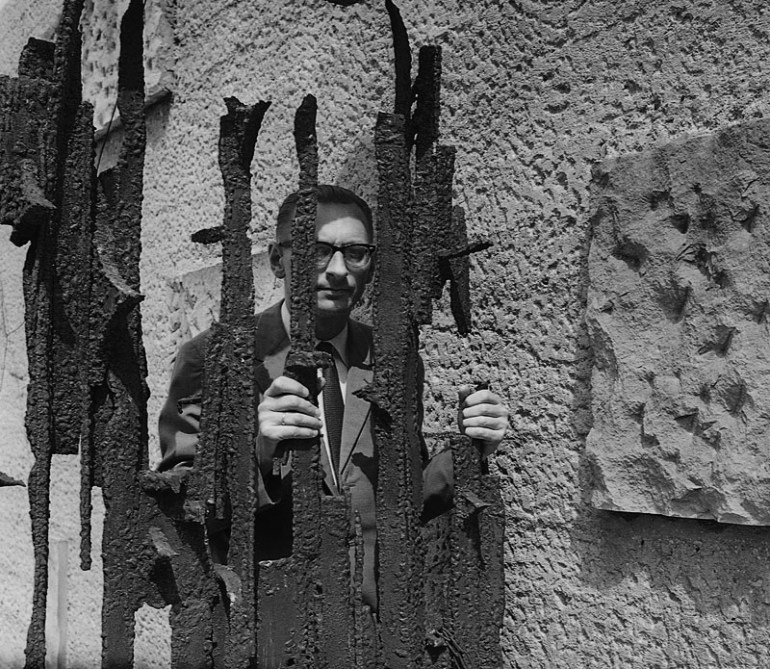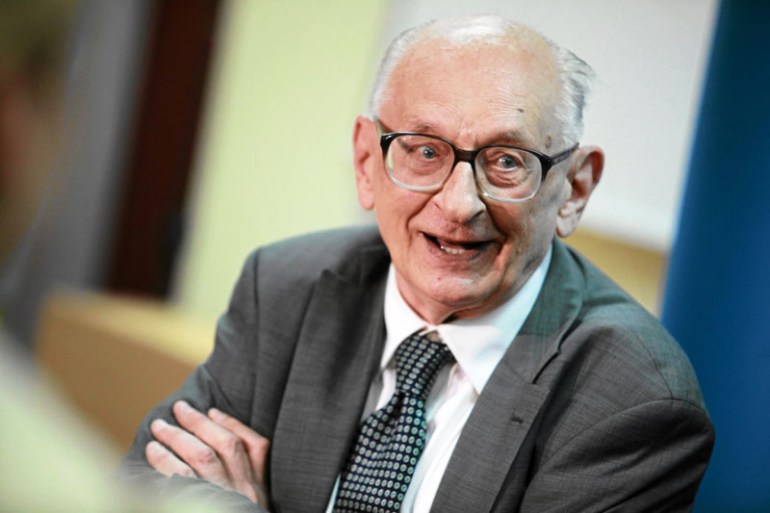He was a member of the Home Army (Armia Krajowa) generation, its active representative and chronicler, as well as a figure of symbolic importance for its fate and role in the times of the Polish transformations after 1945 and 1989.
He came from a family which he personally described as ordinary and white-collar. His father – a successful banker, mother – an accountant. He sympathized with the Polish Socialist Party and the policies of Marshal Piłsudski. He attended well-respected, private, Catholic schools: St. Stanisław Kostka Secondary School and the Przyszłość (Future) Humanities High School in Śniadeckich St., Warsaw. After graduating from high school in 1939, he wanted to attend Polish studies. He didn't, however, manage to achieve that until after his return from the Auschwitz concentration camp – in the autumn of 1941, he joined the underground humanities faculty of the University of Warsaw, where he studied under profs. Julian Krzyżanowski, Maria Ossowska, and Zofia Szmydtowa, together with the poets Tadeusz Gajcy and Zdzisław Stroiński. He completed two years of Polish studies by the time the Warsaw Uprising broke out. He entered the third year of the studies after a one and a half year detention by the Ministry of Public Security, in the autumn of 1948. After another imprisonment, he made another, third, attempt at higher studies, this time externally. In 1962, despite having his master's thesis accepted by prof. Krzyżanowski, Władysław Bartoszewski became crossed off the University's of Warsaw student list right before the final exams. He continued his academic work on his own, outside of any institutions.
 Władysław Bartoszewski, the Pawiak prison, Warsaw, 1967, photo by Tadeusz Rolke
Władysław Bartoszewski, the Pawiak prison, Warsaw, 1967, photo by Tadeusz RolkeHe was incarcerated at the Auschwitz camp for 199 days between 1940/41. He filed a detailed report about that experience to the Polish underground. In August 1942, he joined the conspiracy, working for the Bureau of Information and Propaganda of the Headquarters of the Home Army, the Government Delegation for Poland, and the Catholic Polish Renaissance Front. He was a co-founder of the Żegota – the Polish Council to Aid Jews. He wrote for and edited underground publications. He received the Cross of Valour for his involvement in the Warsaw Uprising. After the dissolution of the Home Army, he collaborated with the Nie organization and the Armed Forces Delegation. He left the conspiracy in October 1945.
He began researching the history of occupation in cooperation with the Central Commission for Investigation of German Crimes in Poland. He spent almost a year working as a journalist for the resistance paper Gazeta Ludowa and an activist of the Polish People's Party. He was eventually arrested in 1946 and remained a political prisoner until the summer of 1954, with a year and a half break. In 1955, he was freed of charges and returned to his work as a journalist and historical researcher. In 1957, he joined Tygodnik Powszechny weekly, with which he worked for fifty years.
 Tadeusz Bartoszewski, Zielona Góra, 2010, photo by Sebastian Rzepiel / AG
Tadeusz Bartoszewski, Zielona Góra, 2010, photo by Sebastian Rzepiel / AGIn 1963, he started working with the Wolna Europa radio station (a cooperation that lasted eighteen years). He was spied on by the Security Service of the Ministry of Internal Affairs, but his was never proven guilty or stopped from this activity. “He spent the last twenty five years using every possible chance to disrupt the Communist Party's policies, adjusting the forms and means of doing that to the current political situation in Poland” - a disappointed Security Service officer admitted in 1970. In spite the obstacles caused by bureaucracy and censorship, or even periodic publishing bans, he continued to release books rewarded by historians and sought-after by the readers. He wrote about the Home Army and the Polish Underground State, German war crimes, the Holocaust, and the Polish-Jewish relations during the German occupation.
From 1963 onwards he frequently visited foreign countries. In London, where he was investigating the archives of the Polish Home Army and Underground State, he gained trust from the Polish diaspora and was offered the position of the President of the Republic of Poland in exile, which he refused. Ha was involved in activities towards Polish-Jewish and Polish-German reconciliation. In 1973, he took over the position of the senior permanent lecturer at the Catholic University of Lublin (KUL), where he conducted a monographic lecture course on the Polish Underground State; during the eleven years of his work there, supervised thirty six dissertations. He was a member of the board of the Polish PEN Club – an organization fighting for the freedom of expression.
In view of his past involvement with the Wolna Europa radio, he was very cautious about any open opposition activities. In 1974, he supported detained leaders of the Ruch conspiracy organization (including Andrzej Czuma and Stefan Niesiołowski). In 1976, he protested agains the changes in the Constitution of the Polish People's Republic. He wrote various studies for the secret Polish Independence League. After the launch of the underground publishing, he defended arrested publishers and journalists. In 1978, he joined the Society for Academic Courses; he also lectured at the flying university. In 1980, he supported strikes in the coast of Poland. He joined Solidarity. He was the co-founder of the Committee for the Defense of Prisoners of Conscience. He participated in the Congress of Polish Culture in December 1981. He was detained during the Martial Law. In 1982 he left for West Germany. He lectured at universities in Munich, Eichstätt, and Augsburg. He took part in international historical seminars on human rights and peacekeeping.
Since 1990, he was working in public administration, as the Ambassador of Poland to Austria (1990-95), twice as a Minister of Foreign Affairs (1995, and 2000-01), a senator (1997-2001), the Secretary of State, the Prime Minister's Representative for International Dialogue (2007-2011). He was the head of the International Auschwitz Committee (from 1990), Council for the Protection of Struggle and Martyrdom (from 2001). He also was the honorary president of the Polish PEN Club and honorary member of the World Association of Home Army Soldiers.
He was awarded the title of the Knight of the Order of the White Eagle. He also received the diploma and the medal of the Righteous Among the Nations (Israel), Order of Merit of the Federal Republic of Germany, Decoration of Honour for Services to the Republic of Austria, the Pontifical Equestrian Order of St. Gregory the Great. He received the honorary degree from: the Polish University in Exile (London), Baltimore Hebrew College, Universities in Marburg, Haifa, Warsaw, Wrocław, Gdańsk, Lublin (KUL), Łódź, Olsztyn, Opole. He was the honorary citizen of: Israel, Lower Silesia, Warsaw, Wrocław, Szczecin, Gdynia. He was a recipient of the Peace Prize of the German Book Trade, the Heine, Guardini, and Emperor Otto Awards (Federal Republic of Germany), the Herder Prize and the Central Europe Award (Austria), the international St. Adalbert Award and Jurzykowski Prize (New York), and in Poland, among others: awards from the Krzywe Koło Club, PEN Club, Poliytka magazine, the TOTUS Award, the Award of the Custodian of National Memory, Kisiel Award, and Super Wiktor Award.
Major works:
- Ten jest z Ojczyzny mojej. Polacy z pomocą Żydom 1939-1945 / This one is from my homeland. Poles aiding Jews 1939-1945 (with Zofia Lewinówna), Kraków 1967
- Warszawski pierścień śmierci 1939-1944 / Warsaw Death Ring 1939-1944, Warsaw 1967
- 1859 dni Warszawy / 1859 Days of Warsaw, Kraków 1974
- Dni walczącej stolicy. Kronika Powstania Warszawskiego / The Days of the Fighting Capital. The Chronicle of the Warsaw Uprising, London 1984
- Na drodze do niepodległości / On the Road to Independence, Paris 1987
- Warto być przyzwoitym. Teksty osobiste i nieosobiste / It is Worthwhile Being Decent: A Sketch for a Memoir, Poznań 1990
- Moja Jerozolima, mój Izrael / My Jerusalem, My Israel, Warsaw 2005
- Dziennik z internowania. Jaworze 15.12.1981 – 19.04.1982 / Diary from the Imprisonment. Jaworze 15.12.1981 – 19.04.1982, Warsaw 2006
- Skąd pan jest? Wywiad-rzeka / Where Are You From? Extended Interview (with Michał Komar), Warsaw 2006
- ...mimo wszystko. Wywiadu rzeki księga druga / In Spite of Everything. Extended Interview vol. 2 (with Michał Komar), Warsaw 2008
- Pisma wybrane 1942-1957 / Selected Works 1942-1957, Volume I , Warsaw 2007
- Pisma wybrane 1958-1968 / Selected Works 1958-1968, Volume II, Warsaw 2007
- Pisma wybrane 1969-1979 / Selected Works 1969-1979, Volume III, Warsaw 2009
- Środowisko naturalne. Korzenie / Natural Environment. The Roots (with Michał Komar), Warsaw 2010
- Życie trudne, lecz nie nudne. Ze wspomnień Polaka w XX wieku / A Difficult, But Not Boring Life. Memories of a Pole in the 20th Century (with Andrzej Friszke), Kraków 2010
- Mój Auschwitz / My Auschwitz, Kraków 2010
- I była dzielnica żydowska w Warszawie / And There Was a Jewish District in Warsaw (with Marek Edelman), Warsaw 2010
Festschrifts:
- Władysław Bartoszewski. Życie i twórczość / Władysław Bartoszewski. Life and Works, ed. Andrzej K. Kunert, Warsaw 1999
- Prawda i pojednanie. W 80. rocznicę urodzin Władysława Bartoszewskiego / Truth and Reconciliation. On the 80th Birthday of Władysław Bartoszewski, scientific ed. Jan Barcz, Warsaw 2002
Author: Andrzej Kaczyński, October 2010, transl. AM, April 2015